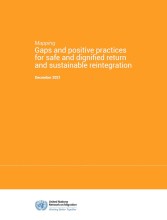Returns and Reintegration

Photo Credits: European Pressphoto Agency
The issue of return and reintegration is a complex one, involving varying and sometimes conflicting interests and priorities in national policies, public opinion and international cooperation. Like decisions to migrate, decisions to return are unique to each person and are influenced by a range of factors. Many migrants return to their countries of origin spontaneously whether out of a desire to return home, to reunite with their families, because of a sense of achievement of their migration goals, or as a result of changed conditions in either their host country or country of origin. Others may be assisted to return, for example through pre-return counselling, logistical, financial and/or reintegration support. Others, when they do not fulfill the legal criteria to remain, may be forcibly returned by states to their countries of origin in accordance with state obligations under international law.
The Network's thematic Working Group on Return and Reintegration seeks to support states in strengthening and improving laws, policies, and practices to ensure that returns are always safe and dignified and that reintegration is sustainable, in line with international law and standards. The Working Group is developing targeted tools and resources to support states in implementing their commitments in the Global Compact for Safe, Orderly and Regular Migration (GCM), including Objective 21 to "cooperate in facilitating safe and dignified return and readmission, as well as sustainable reintegration."
Documents
UN Network on Migration Official Statement: Forced Returns of Migrants Must be Suspended in Times of COVID-19
Read More*References to Kosovo shall be understood to be in the context of United Nations Security Council resolution 1244 (1999).
Newsletter
Subscribe to our newsletter.






